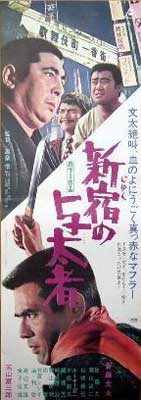 Fresh out of prison, Torpedo Goro (Bunta Sugawara) is almost immediately pulled back into crime. By the final reel of the film all the bad guys are so peeved with Goro, & he with them, that the only thing left to do is have an all out warfare, in Gendai yakuza: yotamono no okite (Modern Yakuza: Law of the Shameless, 1968). Fresh out of prison, Torpedo Goro (Bunta Sugawara) is almost immediately pulled back into crime. By the final reel of the film all the bad guys are so peeved with Goro, & he with them, that the only thing left to do is have an all out warfare, in Gendai yakuza: yotamono no okite (Modern Yakuza: Law of the Shameless, 1968).
This first of the "Modern Yakuza" series from Toei Studios is nothing more than yet another in the endless parade of assembly-line films failing to overcome their miniscule budgets, silly scripts, & restrictive genre conventions. Nevertheless, lanky Bunta Sugawara as the thuggish son-of-a-bitch Goro has a grotesque appeal, & he looks good leaping into angry action.
Goro is an exaggerated anti-hero. He has so much trouble reentering society, & is so grimy & vulgar, he immediately causes the viewer to think that this film intends to contradict the very idea of chivalrous yakuza superheros.
But Goro soon meets up with his clean-cut opposite, the mythical chivalrous yakuza devoted to justice & loyalty, Tetsuo by name, played to perfection by Kyosuke Machida. Though they are nothing alike, these two men are attracted to one another. The scene on the bridge when they swear brotherhood is typically homoerotic. Two men gazing into one anothers' eyes beneath a sky painted by sunset is just so exquisitely signal to the yakuza genre.
Goro is cruel to the woman who loves him, supposedly because he is still in love with a woman from his past, who conveniently doesn't apepar in the plot except in two short, unimportant scenes that completely waste the talents of Junko Fuji. This disinterest in women is in sharp contrast to Goro's loving devotion to his chivalrous boyfriend Tetsuo.
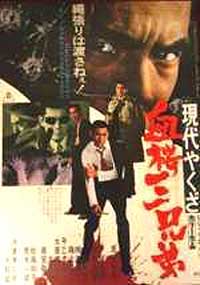 Usually the modern settings for yakuza films are shown to be lacking in the kyokaku idealism of yakuza mores & customs in films set at the end of the Meiji era, or in the 1920s, or in the 1930s. By the modern era, the old mores of Japan have vanished, & yakuza of the modern era just became nastier & nastier in accordance with a cinematic mythology that considers yakuza of the past to be chivalrous commoners, but yakuza of the present to be sociopaths. Usually the modern settings for yakuza films are shown to be lacking in the kyokaku idealism of yakuza mores & customs in films set at the end of the Meiji era, or in the 1920s, or in the 1930s. By the modern era, the old mores of Japan have vanished, & yakuza of the modern era just became nastier & nastier in accordance with a cinematic mythology that considers yakuza of the past to be chivalrous commoners, but yakuza of the present to be sociopaths.
Yet the Gendai Yakuza series wants to have it both ways, & in the pilot episode in particular, it is pretty clear that Goro is an uncontrollable force who cannot fit snugly into the gangster world without causing everyone grief, but his buddy Tetsuo is the perfect ninkyo type "gallant yakuza," but that both are somehow equally good guys. The fact that the gallant yakuza likes the bad-tempered Goro provides evidence that Goro's a hero too.
Tomisaburo Wakayama of the "Lone Wolf with Child" series also plays into the chivalrous aspect of yakuza films. He's the epitome of the Good Boss, though doomed to die in a failed raid against an evil rival boss, much as heroic Tetsuo is shamefully doomed by his loyalty to the evil boss. In the end only scruffy Bunta Sugawara will be left to put his life on the line, killing all the bad guys missed by Wakayama.
The confrontation with the arch-fiend boss takes place in the streets, the stagie set being overtly artificial, neon signs providing the lighting, camera angles tilted & dizzying, the battle bloody to extreme. Yet it somehow fails fully to overcome mere exploitation. The final scene with Bunta drenched in his own blood & that of his fallen enemies is simply too burlesque to convey even the last-minute attempt at irony as Goro observes with annoyance, "Damn, I won't die."
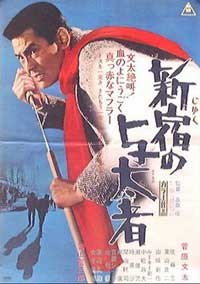 The Modern Yakuza series consisted of six films, & the rest can be counted off more quickly. The second in the series was Gendai yakuza: yotamono jingi (Modern Yakuza: Shameless Obligation, 1969). Yasuo Furuhata directed both the first & second episodes, then never again worked on the series. The Modern Yakuza series consisted of six films, & the rest can be counted off more quickly. The second in the series was Gendai yakuza: yotamono jingi (Modern Yakuza: Shameless Obligation, 1969). Yasuo Furuhata directed both the first & second episodes, then never again worked on the series.
In Tokyo, Goro strives to free his younger brother Satoru (Masakazu Tamura) from a yakuza organization unwilling to forgive a debt.
Also featured is the great Ryo Ikebe as Goro's older brother, Koichi, who unfortunately works for the bad oyabun. How the two older brothers deal with their screw-up baby brother, & how it leads to vengeful bloodshed, provides the meat of the tale.
The third film was Shin Takakuwa's Gendai yakuza: Shinjuku no yotamono (1970) with various English titles:Modern Yakuza: Shameless in Juku; aka, Big Brother Katsumata; or, Thugs Of Shinjuku.
Once again fresh out of jail, Goro takes the name "Big Brother Katsumata." He is as always a smart-mouth wiseguy. Not fitting in well with established gangs, he starts up a new gang with a seedy partner (Mitsura Sato).
The members of their gang are outcasts among outcasts, thugs who only wish they were traditional yakuza. When the Katsumata gang turn up at the funeral for a gangster, they are not welcom, but a gang boss (Tomisaburo Wakayama in a guest appearance) intervenes to keep things calm.
When Goro with his collection of wastrels are invited by a big godfather (Nobuo Kaneko) to allign with an extensive organization, clearly something other than good luck is behind it. Also features Shingo Yamashiro as Seiji the Stutterer, Shizuko Kasagi as Seiji's mother, & Fumio Watanabe as the prison warden.
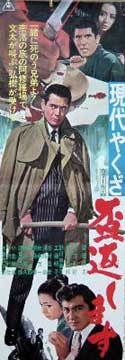 Fourth up is Kiyoshi Saeki's Gendai yakuza: sakazuki kaeshimasu (Modern Yakuza: Returning the Offering Cup, 1971). Fourth up is Kiyoshi Saeki's Gendai yakuza: sakazuki kaeshimasu (Modern Yakuza: Returning the Offering Cup, 1971).
Goro has a chance to rise in the Shinjuku gang, but first he must prove his obedience to a shitty oyabun (godfather) who insists he kill his pal Hideo (Hiroki Matsukata). That's exactly the sort of compromise that'd tick off even an amoral s.o.b. like Goro, whose hackles are raised against the powerful gang.
In Sadao Nakajima's Gendai yakuza: chi-zakura san-kyodai (Today's Yakuza: Three Decoy Blood Brothers aka Three Brothers Of The Bloody Cherry Blossoms, 1971), Goro sends to Tokyo to get his brothers to come to Juku, where they'll take on the big Shinjuku gang in the most violent way possible.
This fifth film was intended as the last episode in the series, but then one more was tacked on when a certain director took a personal interest in reviving Modern Yakuza for one last go:
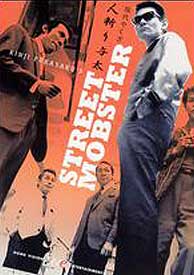 The sixth & final episode Gendai yakuza: hito-kiri yota (1972) is the bloodiest & best in the series, thanks to an ace director, Kenji Fukasaku of Battle Royale & Graveyard of Honor & Battles without Humanity or Justice fame. The sixth & final episode Gendai yakuza: hito-kiri yota (1972) is the bloodiest & best in the series, thanks to an ace director, Kenji Fukasaku of Battle Royale & Graveyard of Honor & Battles without Humanity or Justice fame.
This was the first film he directed with Bunta Sugawara as the star, & it was the beginning of a successful partnership at Toei. Fukasaku helped preserve Bunta's superstar status for several years beyond when so many many other gangster stars were losing the audience they had in the 1960s at the height of the yakuza-eiga craze.
The last in the series is also the most accessible, currently on dvd as Street Mobster, & having been known variously as Modern Yakuza: Outlaw Killers;aka, Bloodthirsty Man; or, Shameless Human Sacrifice.
In the fifth episode the Shinjuko gang was pretty much wiped out. But in the afterthought sixth episode, the gang soon obtained a new boss (real-life retired gangster boss Noburo Ando) who quickly reconstituted the group & its power in the criminal underworld.
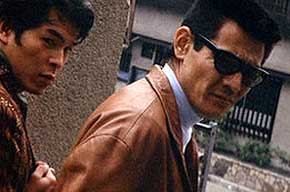 For a while Isamu Okita aka Torpedo Goro & his brothers attempt to get along with the new order of things. They even sacrifice their pinky-tips in apology for past violent deeds. For a while Isamu Okita aka Torpedo Goro & his brothers attempt to get along with the new order of things. They even sacrifice their pinky-tips in apology for past violent deeds.
But there wouldn't be a movie if that fixed things happily, so it very quickly turns to increasing levels of violence, culminating in the bloodiest possible rampage through the ruins of an old factory.
The series in total is very commercial & even Kenji Fukasaku's improved finale lacks much of a story & calls for little actual acting. Of physicality, however, there is plenty, & once a viewer looks past the fact that Goro is a violent madman, there's no denying Bunta Sugawara gives his character real vitality.
For me the deeply gallant nature of Ken Takakura in his best yakuza films, or of Junko Fuji when playing a lady gambler equal to the men, are on a level well above any of Bunta's starring vehicles, certainly above the the "Modern Yakuza" series.
Or the tragic visages of such stars as Takakura, Koji Tsuruta, & Ryo Ikebe have vaster appeal for me than does Bunta's nutty glower & harshness & the greater cruelty written into his character types.
But other viewers not so interested in the more romantic elements of yakuza mythology prefer Bunta the out of control firebrand, & it's not unaccountable why some would prefer him.
copyright © by Paghat the Ratgirl
|
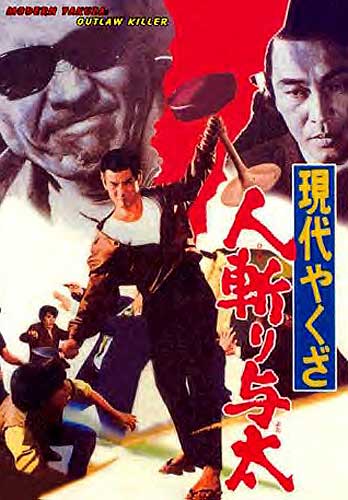

 Usually the modern settings for yakuza films are shown to be lacking in the kyokaku idealism of yakuza mores & customs in films set at the end of the Meiji era, or in the 1920s, or in the 1930s. By the modern era, the old mores of Japan have vanished, & yakuza of the modern era just became nastier & nastier in accordance with a cinematic mythology that considers yakuza of the past to be chivalrous commoners, but yakuza of the present to be sociopaths.
Usually the modern settings for yakuza films are shown to be lacking in the kyokaku idealism of yakuza mores & customs in films set at the end of the Meiji era, or in the 1920s, or in the 1930s. By the modern era, the old mores of Japan have vanished, & yakuza of the modern era just became nastier & nastier in accordance with a cinematic mythology that considers yakuza of the past to be chivalrous commoners, but yakuza of the present to be sociopaths.


 For a while Isamu Okita aka Torpedo Goro & his brothers attempt to get along with the new order of things. They even sacrifice their pinky-tips in apology for past violent deeds.
For a while Isamu Okita aka Torpedo Goro & his brothers attempt to get along with the new order of things. They even sacrifice their pinky-tips in apology for past violent deeds.